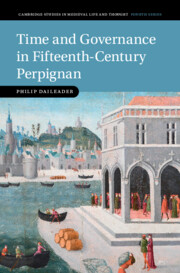Refine search
Actions for selected content:
3 results
Introduction
-
- Book:
- Time and Governance in Fifteenth-Century Perpignan
- Published online:
- 26 July 2025
- Print publication:
- 14 August 2025, pp 1-10
-
- Chapter
- Export citation
Conclusion
-
- Book:
- Time and Governance in Fifteenth-Century Perpignan
- Published online:
- 26 July 2025
- Print publication:
- 14 August 2025, pp 210-212
-
- Chapter
- Export citation

Time and Governance in Fifteenth-Century Perpignan
-
- Published online:
- 26 July 2025
- Print publication:
- 14 August 2025
